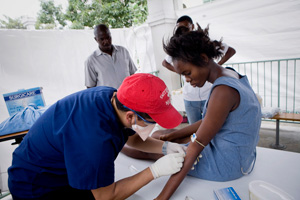
Haiti’s health system was already a shambles before the earthquake with less than 30 percent of the population having access to health care services – and even worse, only 17 percent had access to sanitation.
Credits: Orlinsky/Caritas
Caritas Germany, Dr Joost Butenop – health advisor
Following the Haiti earthquake, Caritas was with the most-affected people from very early on and we managed to save lives and alleviate suffering within our capacity. Our health centres always did more than handing out drugs. People came for comfort and support. Holding a hand or hugging a patient was as important and life-saving as giving antibiotics to children with pneumonia. Most of our consultations in the first months were “psychosocial” in nature rather than medical in that we helped people deal with the emotional impact of the earthquake.
Even before the earthquake struck, the state of the healthcare system in the areas affected by the earthquake was worse than those in most countries I had ever worked in. Haiti’s health system was already a shambles before the earthquake with less than 30 percent of the population having access to health care services – and even worse, only 17 percent had access to sanitation. I did not expect it to be that bad. The earthquake destroyed most of what little existed, leaving the many homeless people in particular utterly vulnerable.
One of the biggest challenges when I was in Haiti immediately after the earthquake was seeing the endless needs and desperation and realising there seemed to be no end to the suffering. Even with ten years of emergency response experience as a doctor, I found it particularly hard to identify those in greatest need in those first few weeks. It was our duty as humanitarians to identify those who needed most help, but in Haiti the need was so immense and so many people had very, very big needs. It was very difficult to finally settle down in one area to start our work knowing that so many others would be left without help.
Caritas’s work meant that it dealt with many aspects of the earthquake other than the medical side of things. The Caritas search and rescue team from Mexico are my heroes. Going three to four metres in the rubble and risking their lives to save people is just an extraordinary feat. It was pure humanitarianism and I felt privileged to have shared time with them.
I went to Haiti four times in 2010. There is so much left to do and focussing on seemingly small aspects remains a challenge for any humanitarian. We have to stay focussed on the work at hand and support our local partner, Caritas Haiti. All the work that is being supported from international NGOs will have to be handed over at some point by our Haitian partners. Building their capacity is a big and responsible task, and to enable the partners to take over in the near future requires us to remain realistic about capacities and sustainability. International Caritas organisations will maintain a presence over the years to come to support and strengthen our local partners in this Herculean task. What I have learned is that experience and professionalism are as important ingredients of humanitarian work as are idealism, humanity, flexibility and the ability to manage chaos.
The Haiti earthquake is something that will stay with me for a long time to come. The scenes of total destruction, the smell and sight of the decaying bodies, the smell of cement still in the air, the aftershocks every day and the expression of total shock in everyone’s face still haunt me even now. It will take years to overcome this I think, but it helps to have been back to Haiti many times in the year following the earthquake and to continue my support and see things slowly improve.
